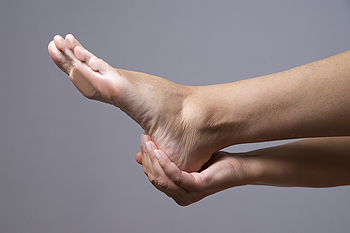 There are several causes of heel pain, and one of these conditions may be referred to as plantar fasciitis. If you choose to wear shoes that are not fitting properly, the foot may undergo severe pain because of the damage that may be inflicted on the plantar fascia ligament. This tissue connects the heel to the base of the toes, and if tearing occurs due to overuse, the result is very painful. Many athletes often endure this type of injury, which typically may be caused from running distances without executing proper stretching and training exercises. Additionally, genetics may be a factor in developing this ailment, which may often affect the structure of the foot. The pain that is experienced is usually described as achiness in the arch or center of the heel, with the pain being the worst in the morning after a night of slumber. It’s suggested that performing proper stretching techniques may help prevent this condition from occurring. If you are afflicted with plantar fasciitis, consider scheduling a consultation with a podiatrist to learn about correct treatment methods.
There are several causes of heel pain, and one of these conditions may be referred to as plantar fasciitis. If you choose to wear shoes that are not fitting properly, the foot may undergo severe pain because of the damage that may be inflicted on the plantar fascia ligament. This tissue connects the heel to the base of the toes, and if tearing occurs due to overuse, the result is very painful. Many athletes often endure this type of injury, which typically may be caused from running distances without executing proper stretching and training exercises. Additionally, genetics may be a factor in developing this ailment, which may often affect the structure of the foot. The pain that is experienced is usually described as achiness in the arch or center of the heel, with the pain being the worst in the morning after a night of slumber. It’s suggested that performing proper stretching techniques may help prevent this condition from occurring. If you are afflicted with plantar fasciitis, consider scheduling a consultation with a podiatrist to learn about correct treatment methods.
Plantar fasciitis is a common foot condition that is often caused by a strain injury. If you are experiencing heel pain or symptoms of plantar fasciitis, contact one of our podiatrists from Active Foot and Ankle Care, LLC. Our doctors can provide the care you need to keep you pain-free and on your feet.
What Is Plantar Fasciitis?
Plantar fasciitis is one of the most common causes of heel pain. The plantar fascia is a ligament that connects your heel to the front of your foot. When this ligament becomes inflamed, plantar fasciitis is the result. If you have plantar fasciitis you will have a stabbing pain that usually occurs with your first steps in the morning. As the day progresses and you walk around more, this pain will start to disappear, but it will return after long periods of standing or sitting.
What Causes Plantar Fasciitis?
- Excessive running
- Having high arches in your feet
- Other foot issues such as flat feet
- Pregnancy (due to the sudden weight gain)
- Being on your feet very often
There are some risk factors that may make you more likely to develop plantar fasciitis compared to others. The condition most commonly affects adults between the ages of 40 and 60. It also tends to affect people who are obese because the extra pounds result in extra stress being placed on the plantar fascia.
Prevention
- Take good care of your feet – Wear shoes that have good arch support and heel cushioning.
- Maintain a healthy weight
- If you are a runner, alternate running with other sports that won’t cause heel pain
There are a variety of treatment options available for plantar fasciitis along with the pain that accompanies it. Additionally, physical therapy is a very important component in the treatment process. It is important that you meet with your podiatrist to determine which treatment option is best for you.
If you have any questions, please feel free to contact our offices located in Fair Lawn, Riverdale, and Englewood, NJ . We offer the newest diagnostic and treatment technologies for all your foot care needs.






